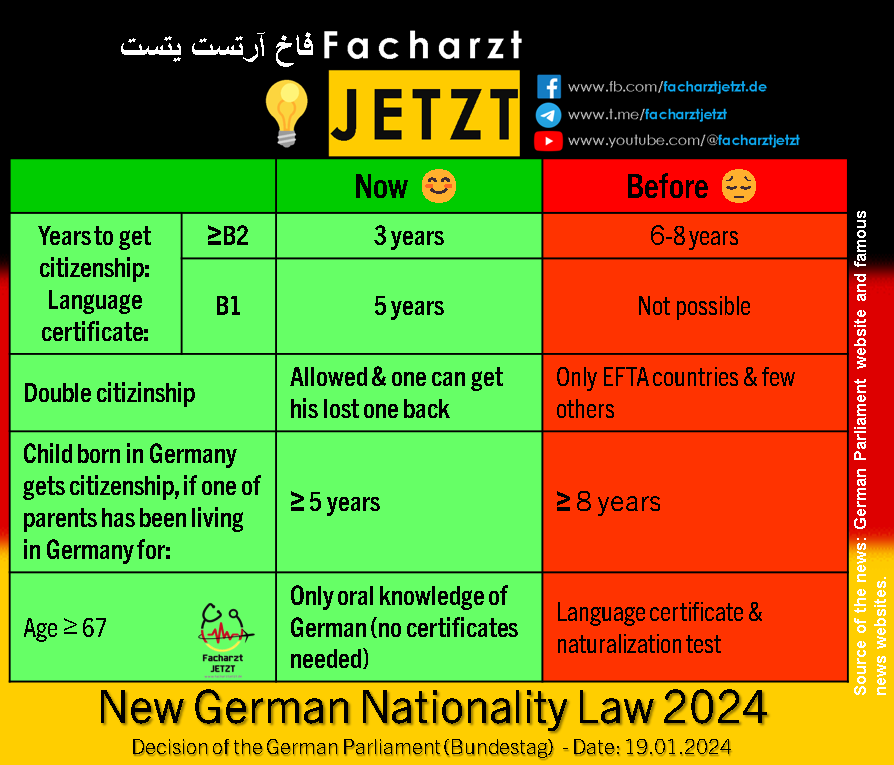
• Introduction to the skilled immigration law
There is a growing demand in many advanced nations to enhance their appeal to skilled workers to address workforce shortages. This necessity drives countries to revise their existing laws to facilitate the entry of skilled workers globally, and Germany is no different. The upcoming skilled immigration law offers numerous advantages for skilled immigrants and is set to be implemented in stages (November 2023, March 2024, and June 2024). This article will specifically delve into the aspects that hold particular significance for doctors.
Related similar articles:
🇩🇪 Steps to start medical residency in Germany🇩🇪 Applying for a German visa: How? Reasons for coming to Germany?
If you have the slightest doubt about a certain point or do not understand any information, ask at any time in the main group of our community “Facharzt JETZT” on Facebook and Telegram (groups will appear as a folder). We remind you that this article is a guidance article to help you understand things and you should not rely solely on it. You should always return to the official websites. 😊
• The possible visas:
If you read the detailed article about the “10 steps to start medical residency in Germany“, then you know that for non-EU citizens to come to Germany, they need to apply for a visa (step number 7).
The Skilled Immigration Law (Das Fachkräfteeinwanderungsgesetz) made major upgrades to the available types of visas that skilled workers, including international medical doctors, can apply to.
• 16D visa
Before the new law (the Skilled Immigration Law), doctors coming to Germany could get a so-called 16D Visa. Here is a summary of the changes made to this type of visa:
| Before the Skilled Immigration Law (Das Fachkräfteeinwanderungsgesetz) | After the Skilled Immigration Law (Das Fachkräfteeinwanderungsgesetz) | |
| Requirements | Before applying for this visa, you must have initiated the recognition process and obtained partial recognition (Defizitbescheid/Bescheid) from a German state (How to do that? The 10 Steps). | If you secure a job offer promise (Stellenzusage) through the ‘recognition partnership,’ you can obtain this visa for Germany without enduring prolonged waiting times for the Defizitbescheid. This residency permit typically has a one-year validity and is extendable for up to three years. In the absence of a Stellenzusage, obtaining the Defizitbescheid is necessary for acquiring this visa. – Article: How to get a job offer promise (Stellenzusage) |
| Working hours before getting recognition of university degree | 10 working hours per week in any job or 20 working hours per week in a position relevant to your field of expertise. | The visa allows for 20 working hours per week in any job. |
| Visa duration | The visa is valid for 18 months and can be extended for up to 24 months. Upon obtaining the Approbation, an additional year is granted to search for employment. | Initially valid for 24 months, it can be extended for up to 36 months. During this visa period, it is advisable to successfully complete the required exams, obtain the Approbation, and proceed to residency training. This progression positions you as a potential candidate for the Blue Card, given that doctors’ salaries significantly surpass the threshold for the so-called ‘bottleneck professions’ (Engpassberufe). With the Blue Card, after 21 months working as a doctor, you become eligible for a settlement permit (Niederlassungserlaubnis). |
Related articles:
• What is a Defizitbescheid plus other terms related to medical residency in Germany (e. g. Approbation, Berufserlaubnis, Stelle, etc.):
🇩🇪 Important & common terms related to working as a doctor in Germany
• To get the Defizitbescheid, you need to apply for the Approbation. Here are the steps:
🇩🇪 Steps to start medical residency in Germany• This is how to find a job and get a job offer promise (Stellenzusage):
🇩🇪 Doctors in Germany: Find job offers & apply intelligently
• 18b visa (Residence permit for skilled workers holding a university degree)
| The old law 😫 | The new law 😊 |
| You could only get this work visa by getting a job in a field that matches your qualifications. Essentially, for doctors, this means a job at hospital or clinic. | You can get this visa by getting any kind of job even if it’s not related to your qualification. This is particularly beneficial to those who have certain skills or degrees other than MBBS and can use this opportunity to maintain a good source of income while you prepare to get your Approbation. |
One notable advantage of this visa is the alleviation of the requirement to provide a blocked account during the visa application process.
Potential job opportunities for International Medical Graduates (IMGs) include roles such as Physician Assistants (Medizinische Fachangestellte), Research Assistant, OP-Assistant, Phlebotomists, and more.
Upon holding this work visa for a period of 3 years (previously 4 years), you become eligible to apply for a settlement permit (Niederlassungserlaubnis).
It is important to acknowledge that positions available to foreign individuals without recognized qualifications/degrees fall under non-regulated jobs. This distinction arises from the necessity of possessing a German license to work in regulated professions.
• Student Visa
This would prove especially beneficial for individuals intending to enter Germany through the Master’s or PhD programs. The previous annual limit of 120 full days or 240 half days for work will now be extended to 140 full days or 280 half days. Additionally, the updated regulation permits students to work up to 20 hours per week.
🇩🇪 For physicians: Doing a Master’s or PhD degree in Germany
🇩🇪 Scholarships in Germany through the DAAD and KAAD
🇩🇪 As a foreign doctor in Germany: How to become a professor?
• Language Visa 16F
Regarding the LANGUAGE VISA 16F, unfortunately, no information is available.
• Opportunity Card (from June 2024):
There are two distinct categories of individuals eligible for this visa:
1. Those who have already had their qualifications recognized
such as doctors with Approbation. For this category, obtaining the visa does not involve additional requirements.
2. Those whose qualifications are yet to be recognized
such as doctors in their home country. This group must demonstrate their qualifications, language proficiency, and other criteria, including age, language skills, professional experience, and ties to Germany. Depending on how much points you’ve accrued (minimum is said to be 6 points), you can get this visa which is valid for 1 year.
Similar to the job seeker visa, this visa allows individuals to be physically present in Germany to search for jobs, provided they can financially support themselves. Secondary employment for up to 20 hours per week is permitted while seeking employment on this visa. If a qualified job as a doctor is secured but a suitable work visa has not been obtained, the opportunity card can be extended for an additional two years.

• Changes made to residence laws:
After coming to Germany, you will move through the following levels:
Visa (das Visum) –> EU Blue Card (EU-Blauekarte) –> Settlement permit (Die Niederlassungserlaubnis) –> German nationality (Deutsche Staatsangehörigkeit) 🥳
I will talk about each one in detail.
• EU Blue Card (Die Blaue Karte)

Medicine is classified as one of the ‘bottleneck professions,’ denoting occupations with substantial demand. Attaining a position as an Assistenzarzt (resident doctor) automatically renders you eligible for the Blue Card. So, to be able to apply for the Blue Card, you need to have a full-time contract.
💡 The Blue Card is the 🇪🇺 EU version of the green card in the 🇺🇸USA.
Facharzt JETZT!
Following 21 months of Blue Card possession, you can then apply for a settlement permit (permanent residency in Germany and in the European Union). See next point.
• Settlement permit (permanent residency in Germany and in the European Union) (Die Niederlassungserlaubnis)
Like mentioned above, you get this permit after 21 months of Blue Card possession. The advantage of this permit is that:
- You are allowed to remain in Germany, even if you lost your job as a medical doctor or want to change your job to another job
- You are no longer required to work full-time. So, you can work like in a 50% job.
- When changing hospitals, you are no longer required to apply for a work permit (Arbeitserlaubnis). Please note, this is something else than Berufserlaubnis. So, you can start working any time you wish in a new hospital and should not wait weeks until the foreigners’ authority (Ausländerbehörde) give you a new Arbeitserlaubnis.
Related articles: Steps to do after being accepted in a job
• Naturalization laws (Getting the German nationality)
As of January 19th, Germany’s parliament has approved new laws allowing individuals to be eligible for citizenship after five years in Germany, or three years in the case of “special integration accomplishments” (as a doctor, you fall in this category because of your language skill and service to the community), as opposed to the previous durations of eight or six years, respectively.
💡Medical doctors can now get the German nationality in 3 years 🥳
Facharzt JETZT!
The new law also accommodates those interested in dual citizenship, permitting individuals to retain their original nationality alongside a German one.

• Author of the article
To make more connections with doctors working in Germany, or diligent medical students like Uche aspiring to work there, then join now our community of Facharzt JETZT for free.
• References
The references used to write the article about the The Skilled Immigration Law (Das Fachkräfteeinwanderungsgesetz) were:
• https://www.make-it-in-germany.com/de/visum-aufenthalt/fachkraefteeinwanderungsgesetz
• https://www.gesetze-im-internet.de/englisch_aufenthg/englisch_aufenthg.html#p0389
• https://www.dw.com/en/changes-to-germanys-skilled-immigration-rules-take-effect/a-67458940
Want to learn more? Questions?
Join JETZT (🇺🇸 now) all of our groups & ask what you like
(On mobile phone: The links are at the end of this page/ On PC: On the right side)
zu den Änderungen bei Arbeitsvisum 18b:
Bitte dazu schreiben, dass man
1. Eine Zeugnisanerkennung des Hochschulabschlusses braucht bei der ZAB
2. noch klarer schreiben, dass man nur qualifizierte Berufe ausüben darf, wo man einen Hochschulabschluss oder eine qualifizierte Berufsausbildung braucht (also mindestens zwei- bis jährige Berufsausbildung mit einem Abschlussdiplom oder einem Bachelorstudienabschluss). z.B. Labortechniker, Biologen, Genetiker, Mathematiker, Physiker etc.) Diese Berufe müssen nichts mit dem medizinischen Beruf zu tun haben, aber es wäre natürlich sinnvoll, in medizinnahen qualifizierten Berufen eine Anstellung zu finden.
3. Ein qualifiziertes Arbeitsangebot und Arbeitsvertrag.
Vielen Dank Frau Pabst 🙂